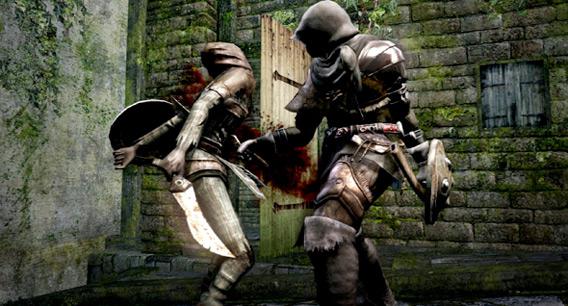Thanks for the kind words, Chris. I look forward to mixing it up with three august game critics whose work I admire. I’ll try my best to hold up my end of the conversation, and you guys try your best to be august. Deal?
This was a tough year to choose a favorite. There was a flood of terrific but flawed games in 2011, and no single game stood out as unequivocally exceptional. I believe that’s a good sign. It suggests the industry is broadening to include more developers who are producing more games that are worth playing. It also means that there are a lot of bad games, and I played more of them this year than ever before. Broken games. Copycat games. Brain-dead games. Ten years ago everybody thought we’d have settled on a dominant gaming platform by now. Instead, we’re playing more games, in more places, and on more devices than ever, and most of these games are forgettable at best.
Still, we have good reason to be hopeful. For the last few years, I’ve served as a judge for the Independent Games Festival. In 2010, the IGF received nearly 400 entries, which was a 30 percent increase from the previous year. This year submissions were up by another 40 percent. An increasing number of young artists see game design as a viable means of expression, and that will help propel the medium forward.
I should note that I have a fairly high tolerance for shortcomings in game design. Chris, you described El Shaddai as “like nothing else I played in 2011,” and I agree. I especially admire its audacious claim that consistency (or even coherence) in environment and level design is an arbitrary metric of quality. I loved the game, but I loved it in spite of its simplistic slasher mechanics, repetitive combat, limited array of foes, and uninspired platforming. These would be ruinous flaws in nearly any other game, but El Shaddai is so full of chutzpah, I couldn’t help but embrace it. I say give us more games willing to run off the rails in service of beauty and a mad devotion to a powerfully felt and stunningly rendered vision.
If I had to characterize what differentiates this year’s crop of games from those of previous years, I’d say its aesthetics. The list of amazingly stylish games I played this year is long: Ilomilo, The Binding of Isaac, Trine 2, Superbrothers: Sword & Sworcery, Bastion—and those are just the indie titles.
Much of what I’m calling “style” can be attributed to careful craftsmanship that extends through each element of design. The visual palette for games has expanded, and developers are incorporating a wider range of artistic styles in their visuals. Great visuals don’t necessarily make a great game, but when their expressiveness extends through the sound, the music, and the overall feel of the gameplay experience, they can elevate an otherwise conventional game into something that feels very special. Take a careful look at Jen Zee’s art direction in Bastion. Her color scheme and soft watercolor environments hearken back to the SNES era, but with a contemporary DeviantArt skew. As each area appears, it slowly builds from the bottom of the screen to the top, reinforcing the game’s ludic imperative: Restore the world by rebuilding Bastion from the ground up.
Have I delayed naming my favorite game long enough? Even as I write this, I could go one of several ways. I’m a sucker for game worlds that draw me in and keep me there, so Skyrim is an obvious contender. I’m a longtime devoted Zelda fan, and Skyward Sword may be the best Zelda game ever made, even though Wind Waker’s soulfulness tugs me a little harder. But if I’m honest about which game had the biggest impact on my life this year—and by that I mean dominating my thoughts while playing and not playing—I must give the nod to Dark Souls.
No game this year put me on the edge of my seat like Dark Souls. No game made me care more about my actions and choices. No game shocked my system so violently or gave me a deeper sense of satisfaction in victory or despair in defeat. If great games transport us to places that cocoon our minds and senses, and if great games grab hold of us, erasing the screen and spanning the distance between game and player, then Dark Souls is surely a great game. At the risk of cliche-mongering, I’d even call it “the gamer’s game” of 2011.
When I wrote about Dark Souls on Brainy Gamer, I described it as a kind of virtual dojo: “Playing Dark Souls intently, over time, is akin to practice, in both the common sense of the word—performing an activity or skill repeatedly to achieve mastery—and in the traditional spiritual sense—deepening our awareness through disciplined focus and effort.” No game requires more persistent mindfulness or more careful attention to technique. The real challenge in Dark Souls is to clear your mind, pay attention, and execute precisely. Sort of like kendo. Actually, a lot like kendo.
I have plenty more to say about Dark Souls (yes, it has frame-rate issues; no, it’s probably not a better game than Demon’s Souls), but first I’m curious to know if anyone else plugs into this game in the mindful way I’ve described.
